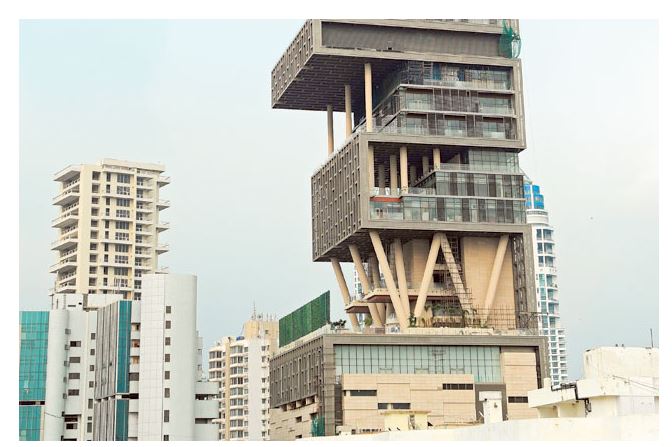Net worth of Mukesh Ambani, chairman of Reliance Industries Ltd., has jumped to $64.5b
The twenty-seven storey Antilia, the residence of Reliance Industries chairman Mukesh Ambani in Mumbai. The net worth of Mukesh Ambani, chairman of Reliance Industries Ltd., has jumped to $64.5 billion, making him the only Asian tycoon in the exclusive club of the world’s top 10 richest people.
Mumbai: Asia’s richest man has entered a new league of wealth.
The net worth of Mukesh Ambani, chairman of Reliance Industries Ltd., has jumped to $64.5 billion, making him the only Asian tycoon in the exclusive club of the world’s top 10 richest people, according to the Bloomberg Billionaires Index. He overtook Larry Ellison of Oracle Corp. and France’s Francoise Bettencourt Meyers, the wealthiest woman, to reach the No. 9 spot.
Also Read: Gamechanger made for Baba Ramdev’s Patanjali Ruchi Soya; Silver rose by investors 70 times in a year
Ambani, who owns 42% of Reliance, has benefited from a flurry of investment into the company’s digital unit, Jio Platforms Ltd., that Reliance said has made it net-debt free ahead of a March 2021 target. The shares of the Indian conglomerate have doubled from a low in March, just as other billionaires on the list have been hit by the impact of the coronavirus pandemic.
While the Indian economy “has been nearly decimated” during the lockdown to control the spread of Covid-19, “Mr. Ambani’s companies (particularly the telecom giant Jio) have prospered, and his personal wealth has increased substantially,” said Jayati Ghosh, chair of the Centre for Economic Studies and Planning at the Jawaharlal Nehru University.
A media representative for Reliance declined to comment on Ambani’s fortune.
Economic Divide
The rise of the 63-year-old as India heads for its worst-ever recession is a reminder of the nation’s deep economic divide, in which the top 10% hold more than three-quarters of the total wealth, and where most new fortune creation stays in the hands of the richest 1%. Ambani lives in a 27-story mansion in Mumbai, known as Antilia, that has three rooftop helipads, parking for 168 cars, a 50-seat movie theater, a grand ballroom with crystal chandeliers, three floors of Babylon-inspired hanging gardens, a yoga studio, and a health spa and fitness center.
While a crash in oil prices caused uncertainty in a stake sale of Reliance’s oil and chemicals division, in just two months Jio managed to attract some $15 billion – more than half the investment into telecom companies worldwide this year. Facebook Inc., General Atlantic, Silver Lake Partners, KKR & Co. and Saudi Arabia’s sovereign wealth fund are among those trying to get a slice of one of the world’s fastest-growing online commerce markets. A June report by Sanford C. Bernstein predicted that Jio is likely to capture 48% of India’s mobile subscriber market share by 2025.
In the latest potential deal slated to bolster Ambani’s e-commerce ambitions, Reliance is close to acquiring stakes in some units of Future Group, which already has a partnership with Amazon.com Inc., people familiar with the matter have said.
Ambani got his start in the family’s business in the early 1980s, when his father, Dhirubhai Ambani, summoned him back to India to oversee construction of a polyester mill after a year at Stanford Business School. The Ambanis began to buy up suppliers as well as petrochemical plants and oil refineries and eventually built the company into a fabrics, textiles and energy empire. Dhirubhai died of a stroke in 2002 without leaving a will, triggering a feud between Mukesh and his brother, Anil.
In a settlement brokered by their mother, the brothers split the family business. Mukesh retained control over the refining, petrochemicals, oil and gas, and textiles operations, while Anil took the telecommunications, asset-management, entertainment and power-generation businesses. In 2013, the brothers announced a $220 million pact to share a fiber-optic network, their first deal since splitting the Reliance empire. Parts of Anil’s operations have since struggled, with a unit of his Reliance Communications Ltd. filing for bankruptcy last year.
Mukesh revels in being the biggest. In India, Reliance officially became just that last year, when it surpassed state-owned Indian Oil Corp. to become the country’s largest company by revenue. At Reliance’s annual shareholder meeting in August, which is covered like a national event – including by its media and entertainment arm, Network18 – Ambani called it the “golden decade of Reliance.” He celebrated the group’s growing list of superlatives: the largest telecom enterprise by subscribers, revenues and profit; a retail arm larger than all other major retailers combined; an oil giant that makes India’s largest export.
“We are also incubating newer growth engines,” Ambani said at the time, adding that he hoped the digital-driven expansion could be more inclusive. “No power on earth can stop India from rising higher.”
At least on the global wealth ranking, that seems to be the case.




